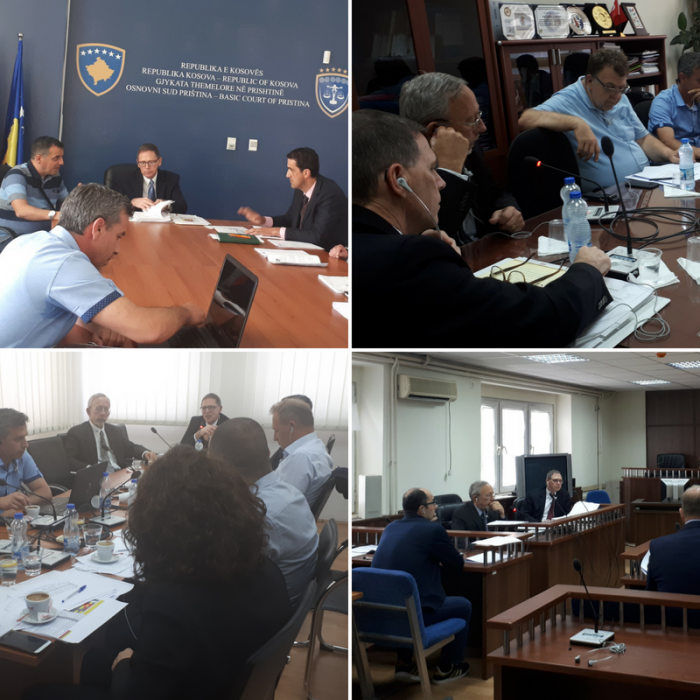State Courts Partnership
In 2017, the UA Little Rock William H. Bowen School of Law entered into an agreement with the National Center for State Courts (NCSC), creating the State Courts Partnership, the only such partnership in the United States.
The NCSC was created in 1971 with the mission “to improve the administration of justice through leadership and service to the state courts and to courts around the world.” Its headquarters are located in Williamsburg, Virginia with additional offices in Arlington, Virginia; Washington, D.C.; and Denver, Colorado.
The State Courts Partnership, while participating in NCSC initiatives, is housed at the law school and also works on projects directly affecting Arkansas courts and the state’s legal community. Its director, J.D. Gingerich, previously served for twenty-eight years as the Director of the Arkansas Administrative Office of the Courts.
The projects undertaken by this one-of-a-kind partnership benefit the NCSC, the law school, and the local, national, and international legal community. The work directly affects the administration of justice, and the NCSC and the State Courts Partnership impact Bowen’s core values of public service, access to justice, and professionalism.
Services and Projects
Arkansas Court Security and Emergency Preparedness Plans
In 2005 the Arkansas Supreme Court created the Arkansas Taskforce on Court Security to examine courthouse security in the state and to offer recommendations to the Supreme Court. In 2007 the Arkansas General Assembly enacted the Arkansas Court Security Act (Act 576 of 2007) and provided that the Supreme Court should establish “standards for every county and city for the development of a local security and emergency preparedness plan.”
On February 1, 2007 the Supreme Court adopted Minimum Security Standards and a requirement that “… a Local Security and Emergency Preparedness Plan be drafted and approved in
every county.” The plans consist of four separate components, including:
- a facility assessment of every building in which court proceedings take place or court employees are located,
- a court security plan,
- an emergency response plan, and
- a continuity of operations plan.
To date, no action has been taken against local governments that have failed to complete and submit the required plans. However, since 2008, the Arkansas General Assembly has provided annual funding to the Administrative Office of the Courts to award grants to cities and counties to improve courthouse security. Since that time, more than $2.2 million in grant funds have been awarded to local governments. Many jurisdictions do not receive funding because they have not completed the plans.
The State Courts Partnership provides the expertise to undertake all of the necessary steps to complete and submit to the state each of the four components of the required Court Security and Emergency Preparedness Plan (CSEMP). These services will be provided at a flat rate which is inclusive of all costs.
Cost for Services
Court Facility Assessments (includes one site visit and other services described below) – $500 per facility.
Court Security Plan (includes one site visit and other services described below) – $1,000
Emergency Response Plan (includes one site visit and other services described below) – $1,000
Continuity of Operations Plan (includes two site visits and other services described below) – $1,500
Services will include travel to the local jurisdiction, in-person and telephone communication with local officials and committees, assistance and advice to aid local policy decisions, and the drafting and final submission of the assessment or plan. The final product will be consistent with all standards and guidelines established by the Arkansas Supreme Court Committee on Security and Emergency Preparedness.
Conference of Chief Justices
The Conference of Chief Justices (CCJ), comprised of the chief justices from all 50 states and 7 U.S. territories, is provided research and support services through the NCSC. The CCJ President also serves as the president of the NCSC Board of Directors. Gingerich currently serves as the primary staff for two committees of CCJ.
Following the rise in the number of incidents and arrests by federal immigration officials inside state court facilities, the CCJ created a special committee to represent the conference in conversations and negotiations with Immigration and Customs Enforcement and the U.S. Department of Homeland Security. The effort is chaired by Nebraska Chief Justice Mike Heavican and includes the chief justices of New York, Texas, Arizona, Iowa and New Jersey.
Gingerich has prepared legal memoranda and policy documents and participated in multiple meetings between the committee members and officials from DHS and ICE. He developed a website and resource materials made available through the NCSC. Information about courthouse arrest incidents is reported to the Partnership, which also serves as the central point of contact regarding the issue for all members of CCJ. As a result of these activities, ICE released a revised policy on courthouse enforcement.
Gingerich is facilitating meetings in each state between the chief justice and DHS/ICE representatives to discuss the implementation of the new policy. He has published two journal articles on the topic of courthouse immigration arrests and conducted a workshop during the Annual Conference of the National Association for Court Management.
 In the fall of 2017, CCJ and the Conference of State Court Administrators (COSCA) created the National Judicial Opioid Task Force. Gingerich serves as Senior Counsel to the Task Force. It is chaired by Indiana Chief Justice Loretta Rush. He provides research and assistance to the Executive Committee and is working closely with a work group responsible for education and collaboration issues. Meetings of the Task Force have taken place in Washington D.C., and Hendersonville, Nevada, and the next meeting will take place in June in Indianapolis. The collaboration efforts involve outreach to state, federal, and tribal courts throughout the U.S. to examine those programs and resources already in place and to develop resources which respond to the specific needs of the state courts.
In the fall of 2017, CCJ and the Conference of State Court Administrators (COSCA) created the National Judicial Opioid Task Force. Gingerich serves as Senior Counsel to the Task Force. It is chaired by Indiana Chief Justice Loretta Rush. He provides research and assistance to the Executive Committee and is working closely with a work group responsible for education and collaboration issues. Meetings of the Task Force have taken place in Washington D.C., and Hendersonville, Nevada, and the next meeting will take place in June in Indianapolis. The collaboration efforts involve outreach to state, federal, and tribal courts throughout the U.S. to examine those programs and resources already in place and to develop resources which respond to the specific needs of the state courts.
Part of his work involves the creation of a comprehensive survey of opioid litigation and legislation in each state, which is published on the Judicial Opioid Task Force website.
Institute for Court Management
 Gingerich is also part of the national faculty of the Institute for Court Management (ICM), which is the education arm of the NCSC. During the past year he has taught courses in California, Nevada and Ohio, with upcoming commitments to teach in Florida, Michigan and Virginia. ICM provides the training as a part of the national certification of court managers and court executives.
Gingerich is also part of the national faculty of the Institute for Court Management (ICM), which is the education arm of the NCSC. During the past year he has taught courses in California, Nevada and Ohio, with upcoming commitments to teach in Florida, Michigan and Virginia. ICM provides the training as a part of the national certification of court managers and court executives.
Gingerich was recently offered a contract for the Partnership and is developing the curriculum and materials for a new ICM course on Judicial Branch Leadership, which will be used as a part of the national certification program to improve the leadership skills of court administrators and managers across the country.
State Court Consulting Division
Through its office in Denver, Colorado, the NCSC provides consulting services for state and local courts across the U.S. During the past year Gingerich has provided consulting services for three court improvement projects. The first, in Lansing, Michigan, involved an evaluation of the judicial education programs and offices of the Michigan Supreme Court. More recently, he traveled on several occasions to Dakota County, Minnesota, working with the District’s 19 trial judges to review and implement a new case assignment and calendaring system designed to make their court system more efficient.
He has also worked with the judges, prosecutors and public defenders in Washoe County (Reno), Nevada, to examine a number of case management and calendaring issues.
NCSC International Services Division

The International Division of the NCSC offers a similar array of research, consulting, education, and information services to strengthen the rule of law in countries around the world. Currently, Gingerich and the State Courts Partnership have been involved in the Justice System Strengthening Project, funded by the U.S. Agency for International Development, in Kosovo.
Gingerich traveled to Kosovo in November for the first part of the project, where he worked with the Kosovo Supreme Court and the Kosovo Judicial Council to conduct a comprehensive evaluation of the process by which the judicial branch prepares and submits the annual judiciary budget to the Kosovo Parliament. He then prepared and submitted recommendations for the establishment of a revised process, with greater inclusion and participation by local courts and utilizing the techniques and goals of “performance-informed budgeting.”
In March the Kosovo Judicial Council adopted the recommendations and invited Gingerich to return to Kosovo to conduct workshops at each court location to assist in the development of budget requests and to further implementing the plan.
Evaluation of Arkansas Specialty Courts
The State Courts Partnership was also included as a part of the NCSC’s successful bid to conduct a statewide evaluation of all specialty courts in Arkansas. Requested and funded by the Arkansas Specialty Court Commission, the evaluators are collecting and examining data about participants and their outcomes in each of the state’s specialty court programs.
 As a part of the project, two Bowen students were employed to administer, review and tabulate the results of surveys provided to judges and officials at each court. The surveys included all aspects of each court’s criteria for accepting cases, their methods and operations, and administration. The result of their efforts will be Arkansas’s first comprehensive directory of specialty court programs.
As a part of the project, two Bowen students were employed to administer, review and tabulate the results of surveys provided to judges and officials at each court. The surveys included all aspects of each court’s criteria for accepting cases, their methods and operations, and administration. The result of their efforts will be Arkansas’s first comprehensive directory of specialty court programs.
“I have been impressed by the quality of work provided by our students during this project,” Gingerich said. “They can take great pride that their work product will soon be in the hands of judges and program directors across the state to assist them in the operation of their courts and will be used by Arkansas executive and legislative branch officials as they evaluate the programs and develop policy and programs for the future.”
Arkansas State Court Fellows Program
This program educates law students about the profession of court administration and the career opportunities available in the state and federal court systems.
Court administrators are essential components in the administration of justice. As the modern court system has become more complex, professional administrative staff allows judges to more efficiently fulfill their constitutional responsibilities. Court administrators work to provide executive direction and policy development for the court, ensuring efficient and effective judicial operations.
As part of the program, Bowen offers a one-hour credit course entitled “The Administration of the Courts” which is open to all Bowen students who have completed at least their first year of law school but who are not scheduled to graduate. After the completion of that course, students will be eligible to apply to the Arkansas State Court Fellows Program. Two individuals will be selected.
The selected State Court Fellows are invited to attend and observe the annual meeting of the Arkansas Association of Court Management and the Arkansas Trial Court Administrator Conference. The Administrative Office of the Courts then enrolls the Fellows and support their attendance and participation in the national court manager certification program offered through the National Center for State Courts. The program, consisting of six three-day courses usually offered with an enrollment fee of $750 per course, will be provided at no cost to the Fellows. At the conclusion, the Fellows will be qualified as Certified Court Managers, a national credential recognized by state court systems throughout the country.
In addition, Each Fellow will be placed as a paid intern in the office of a circuit court judge and court administrator so they may observe and participate in the work of a court administrator.
The State Court Partnership, provides assistance and support to the Fellows following their selection and during their service. This includes preparing them for their service as Fellows, establishing and managing the details of their internship, and serving as the first point of contact when questions arise from the Fellows or from the Administrative Office of the Courts.
In addition to this Fellowship, the law school’s Career Services Office will actively search, compile, and share job postings in court administration in state and federal courts, particularly those requiring completion of a law degree, and assist interested students in their pursuit of a career in court administration.
For more information about the National Center of State Courts, visit the website. For more information on the State Courts Partnership, contact J.D. Gingerich.

